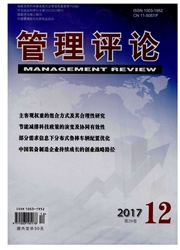

 中文摘要:
中文摘要:
员工的建言行为对处于动态的、复杂的和多变的环境中的组织尤为重要。基于计划行为理论有机整合个体对自身与组织的价值观匹配的认知、组织自尊、情感承诺和感知的组织支持,试图揭示多个因素对建言行为的复杂作用机理。对多行业的330套配对样本的实证分析证实:员工-组织价值观匹配对员工的建言行为具有积极影响;情感承诺中介员工-组织价值观匹配对建言行为的影响;当感知的组织支持较高时,不仅增强了员工-组织价值观匹配和情感承诺各自对建言行为的积极作用,而且增强了因员工-组织价值观匹配产生的情感承诺对建言行为的积极影响;员工-组织价值观匹配不仅积极影响员工的组织自尊而且进一步影响情感承诺,从而促进员工的建言行为。文章提供了在管理实践的应用启示和建议。
 英文摘要:
英文摘要:
Employee voice behavior is particularly important for the organization in a dynamic, complex and ever-changing environment. In recent years, there has been a rapidly growing number of conceptual and empirical researches focused on better understanding the motives underlying voice, individual, and situational factors that increase employee voice behavior. Person-organization value fit has important influences on employee job satisfaction, affective commitment, and extra-role behavior. However, few studies have focused on how fit between employee and organization influences employee voice behavior. Based on the theory of planned behavior, this study firstly in- troduces person-organization value fit to find how promote employees to voice. Integrating person-organization value fit, organization based self-esteem, affective commitment and perceived organizational support into an organic system to reveal the complex mechanism about how multiple factors influenced voice behavior. By using structural equation model and multiple linear regression to analyze the 330 pairs valid samples, we conclude that: person-organization value fit has positive effect on employee voice behavior; affective commitment mediates person-organization value fit and voice behavior; perceived organizational support not only separately moderates the relationships between person-organization value fit, affective commitment and voice behavior, but also moderates the mediating effect of affective commitment between person-organization value fit and voice behavior; person-organization value fit not only has positive effect on employee organization based self-esteem but also further affect affective commitment, so as to promote employee voice behavior. This study gives some specific suggestions to management practice in organizations.
 同期刊论文项目
同期刊论文项目
 同项目期刊论文
同项目期刊论文
 期刊信息
期刊信息
